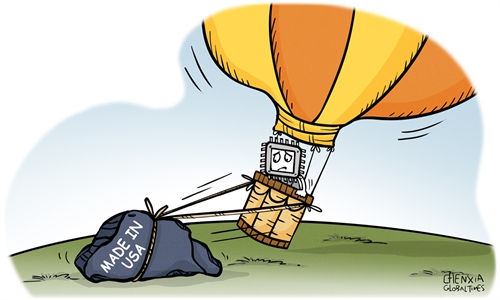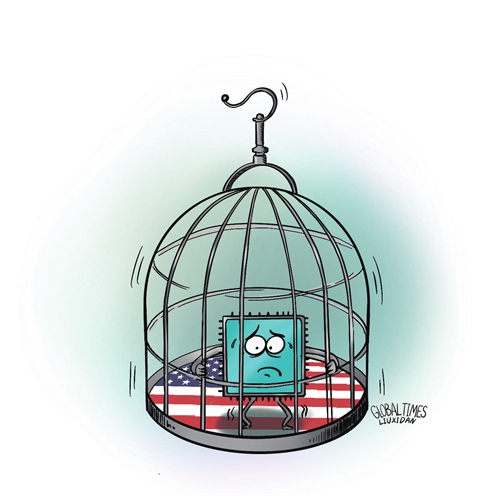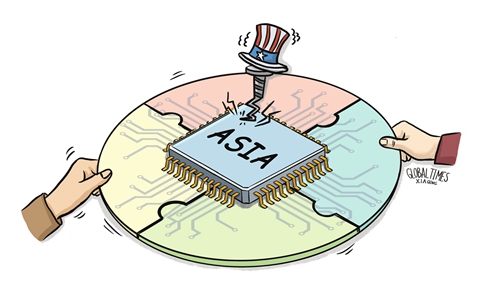
Photo:VCG
US Ambassador to Japan Rahm Emanuel said the US is in discussions with Japan, the Netherlands and South Korea over restricting semiconductor exports to China, and it needs all parties to agree on a deal, Bloomberg reported on Monday. That sounds more like another round of pressuring.However, the US' chip containment strategy against China is likely to show more signs of failure in 2023, not just because uncertainty remains about reaching a strong consensus with its allies, but also China's technological breakthroughs will see unilateral crackdowns increasingly lose effect.
While Emanuel claimed "all the parties have a mutual shared interest in the outcome," the irony is that in imposing unilateral restrictions on exports of semiconductor-related products and technologies to China, the US neither listened to the opinions of its allies, nor showed any regard to their interests.
Given the leading positions of their companies in the global semiconductor industrial chain, South Korea, the Netherlands, and Japan are considered to play crucial roles in determining the real effectiveness of the US' unilateral chip bans. Their companies' massive business interests in the Chinese market are also at great risk. It is highly questionable whether all of them truly believe the US can block the development of China's semiconductor industry by imposing export bans. If anything, the "resistance" showed by the Netherlands and South Korea these days against pressure from Washington is sufficient to show their reluctance to follow the US' chip ban.
The reasons behind their reluctance are straightforward. The semiconductor industrial chain is one of global collaboration and global division of labor, and China is the world's largest semiconductor consumption market. Cooperating with the US government's export bans means that companies could face the risk of losing the Chinese market, which is tantamount to "commercial suicide." Such losses will be painful for any country and any company. Looking at the financial reports of US semiconductor companies, it is not hard to conclude that the costs of adhering to technological containment against China will be increasingly unbearable.
Most importantly, what will make the US' chip containment strategy against China fall flat is China's continuous technological progress. First of all, China's semiconductor sector has been developing fast despite the US pressure, especially in terms of the mass production of 28 nanometer chips. While 28 nanometer chip represents a decade-old technology, it is still widely used in most electronic products as a mature product. With major chipmakers ramping up production of 28 nanometer chips, China will be able to achieve self-sufficiency in most downstream industries in its own right.
Moreover, Chinese tech giants like Huawei are constantly making breakthroughs in semiconductor technology. Take Huawei as an example. Its goal has been very clear, which is to address the existing chip supply problems by increasing input in research and development based on the actual conditions of the domestic chip sector. Huawei's smartphones may be close to being equipped with high-process chips with the technological breakthroughs of chip stacking technology, according to Chinese media reports.
Finally, as China is gradually walking out of the shadows of the epidemic, a full recovery of Chinese supply chains is bound to be around the corner, which will make Chinese electronic products using semiconductors even more competitive in the global market. For instance, European vehicle supplier Forvia's chief executive Patrick Koller told the Consumer Electronics Show audience in Las Vegas that Chinese car makers can build an electric vehicle for 10,000 euros ($10,618) less than European counterparts, an overwhelming cost advantage that will put pressure on European manufacturers in their home market.
It is undeniable that Chinese carmakers' chip supply has been affected to a certain extent, especially high-end ones used in design and manufacturing. But as things stand, the vast majority of chip usage in China has not been curbed, and China's production is rising fast. Meanwhile, China's R&D in this area is also catching up, and there will be breakthroughs in the coming years. This is also due to the US containment, which forced China to strengthen the development of independent chip industrial chain.
Those who block others will only lead themselves to a dead end. China's development of self-reliant chip industry is the best example of how the US has actually pushed itself into a corner.



